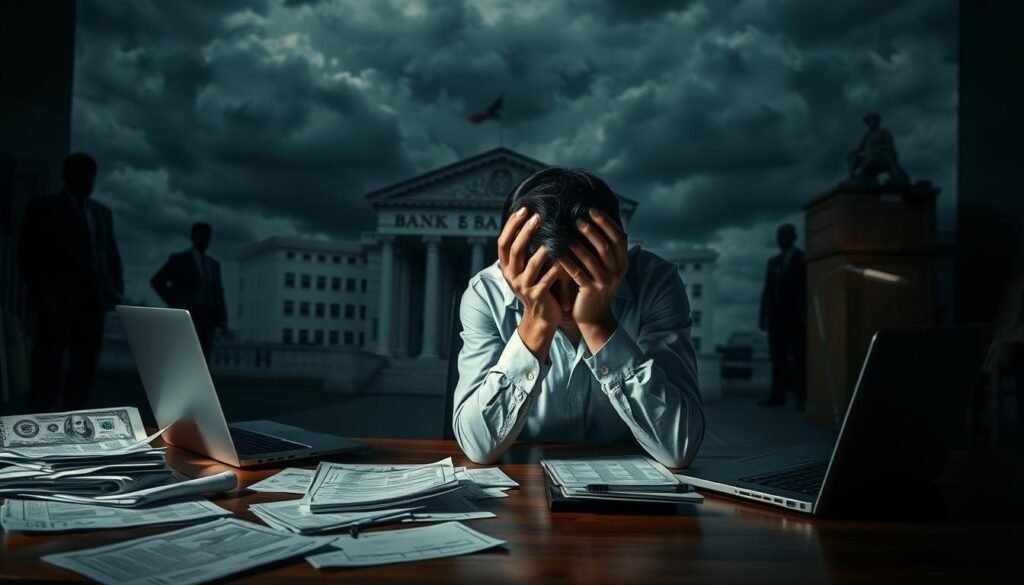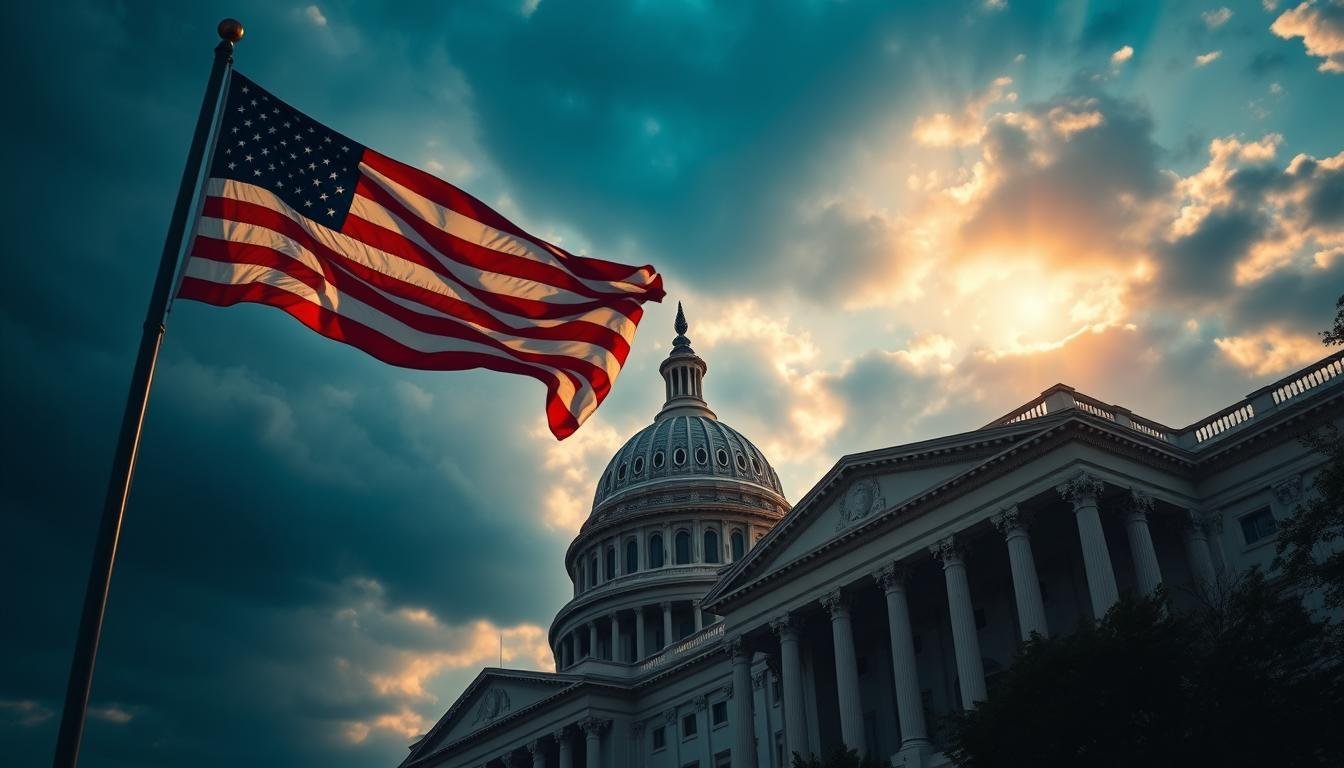Can the President Legally Freeze Your Bank Accounts? Ever wondered about the presidential powers over your money? The question of whether the President can freeze your bank accounts is complex. It involves understanding the legal rules behind such actions.
This isn’t just about the President’s power. It’s also about how it affects your financial freedom. Knowing the limits of this power is key in today’s shaky economy.
We’ll look into the legal side and how it might affect your financial assets. This includes the chance of bank account freezes. [Can the President Legally Freeze Your Bank Accounts?]
Contents
- 1 Presidential Powers Over Financial Assets
- 2 Can the President Freeze Bank Accounts? Legal Framework
- 3 Historical Precedents of Presidential Asset Freezes
- 4 Circumstances That Could Trigger Account Freezes
- 5 How Asset Freezes Affect Ordinary Citizens
- 6 Understanding the Implications of Presidential Powers on Your Finances
- 7 FAQ: Can the President Legally Freeze Your Bank Accounts?
- 7.1 Can the President freeze bank accounts without a court order?
- 7.2 What is the International Emergency Economic Powers Act (IEEPA)?
- 7.3 Under what circumstances can the President declare a national emergency?
- 7.4 How can individuals protect their bank accounts from being frozen?
- 7.5 Can the President freeze bank accounts of individuals who are not suspected of any wrongdoing?
- 7.6 What are the implications of a bank account freeze for individuals and businesses?
Presidential Powers Over Financial Assets
To understand the President’s powers over financial assets, we need to look at the Constitution and laws. The President can greatly influence financial assets through executive orders. These orders can change financial rules a lot.
The Constitution gives the President some powers that affect financial assets. For example, the President can declare national emergencies. Laws like the International Emergency Economic Powers Act (IEEPA) let the President put economic sanctions and freeze assets. These steps are usually taken when there’s a big threat to national security.
Using executive orders to control financial assets brings up big questions. It’s about the balance of power between the President and other government branches. It also shows we need clear rules and checks to prevent misuse of these powers.
In summary, the President has a lot of power over financial assets. This power can greatly affect financial rules and the economy. It’s key to understand these powers to see their full impact.
Can the President Freeze Bank Accounts? Legal Framework
Ever wondered if the President can freeze your bank account? It’s key to look at the legal rules that could allow this. The President’s power to freeze bank accounts comes from laws passed over time.
Key Provisions and Scope
The laws that let the President freeze bank accounts have important parts. The International Emergency Economic Powers Act (IEEPA) is a main law. It lets the President declare emergencies and freeze assets. This law also lets the President control international money moves and apply economic sanctions.
The President’s powers are very wide. They can freeze money of people or groups seen as threats to national security or foreign policy. [Can the President Legally Freeze Your Bank Accounts?]
Declaring a national emergency is a big move. It starts the President’s powers under the IEEPA. The President must say there’s a threat to the nation’s safety, economy, or other key areas. This is done with an executive order.
After a national emergency is declared, the President can freeze bank accounts. The President must tell Congress about this. The emergency can be reviewed and renewed over time.
Knowing these laws and how to declare an emergency is important. It helps understand why the President might freeze bank accounts. This area of law is complex. It tries to balance national security with personal rights.
Historical Precedents of Presidential Asset Freezes
Throughout U.S. history, Presidents have used executive actions to control finances. They do this during national crises or to enforce economic sanctions. [Can the President Legally Freeze Your Bank Accounts?]
President Franklin D. Roosevelt’s Executive Order 6102 in 1933 is a key example. It mainly targeted gold ownership but showed the President’s power over financial assets in tough times.
Recently, Presidents have also frozen assets of foreign entities and individuals. The International Emergency Economic Powers Act (IEEPA) has been used for this purpose. It targets those seen as threats to national security.
| Year | President | Action |
|---|---|---|
| 1933 | Franklin D. Roosevelt | Executive Order 6102 |
| 1979 | Jimmy Carter | IEEPA invoked for Iran sanctions |
| 2014 | Barack Obama | Executive Order 13662 for Ukraine/Russia sanctions |
These examples show the President’s big role in managing finances in crises. Knowing about these actions helps us understand what might happen in the future.
Circumstances That Could Trigger Account Freezes
The power to freeze bank accounts is often linked to a national emergency. When such a declaration is made, it gives the President special powers. These powers allow them to manage and control financial assets.
Definition of “Emergency”
An emergency is a sudden and serious event that needs immediate action. In finance, this could mean economic crises, terrorist threats, or natural disasters. These situations can destabilize the financial system.
- Economic crises that threaten national stability
- Terrorist threats or attacks on financial infrastructure
- Natural disasters that severely impact the economy
Scope and Duration Limitations
The scope and duration of account freezes have legal limits. These limits aim to balance executive action with protecting individual rights. [Can the President Legally Freeze Your Bank Accounts?]
The President’s power to freeze assets is not without bounds. There are specific rules that guide these actions. They ensure the actions are targeted and fair to the threat. Also, the length of these freezes is usually short, needing regular checks and reasons.

- The President must declare a national emergency.
- The freeze must be necessary to address the emergency.
- The scope and duration must be clearly defined and limited.
Knowing these rules is key for citizens to understand financial regulations during crises.
See Also: Who Was the President During 9/11?
How Asset Freezes Affect Ordinary Citizens
Asset freezes can really affect people’s daily lives. They can make it hard to manage money, leading to trouble and loss. It’s important to know how to handle these situations.
So, how do you keep your money safe? One good way is diversification. This means spreading your money across different places. It helps avoid losing everything if one place gets frozen.
Diversification of Assets
- Spread your money across different bank accounts.
- Invest in various things like stocks, bonds, and real estate.
- Keep some money in easy-to-get savings accounts.
It’s also key to have an emergency fund. This money is ready to use when you need it, helping you deal with financial problems. [Can the President Legally Freeze Your Bank Accounts?]
Emergency Fund Considerations
- Make sure your emergency fund is easy to get to.
- Think about putting it in a high-yield savings account.
- Try to save enough for a few months of living costs.
By spreading your money and having a solid emergency fund, you can lessen the blow of asset freezes. Being informed and ready is crucial for dealing with these financial hurdles.
Understanding the Implications of Presidential Powers on Your Finances
The President has a lot of power over money, like freezing bank accounts in some cases. This power comes from laws and past actions. It can affect regular people a lot.
Freezing accounts can happen during emergencies or if there’s a money crime suspicion. Knowing this helps you prepare your finances better. [Can the President Legally Freeze Your Bank Accounts?]
Learning about the President’s financial powers helps you deal with the money system. It lets you make smart choices to keep your money safe.
See Also: Did Brent Peterson Run for President? Find Out Now
FAQ: Can the President Legally Freeze Your Bank Accounts?
Can the President freeze bank accounts without a court order?
Yes, the President can freeze bank accounts in certain situations. This includes during a national emergency, thanks to laws like the International Emergency Economic Powers Act (IEEPA). No court order is needed in these cases.
What is the International Emergency Economic Powers Act (IEEPA)?
The IEEPA is a law that lets the President act quickly in emergencies. It allows for economic sanctions, like freezing assets, to protect national security and the economy.
Under what circumstances can the President declare a national emergency?
The President can declare a national emergency for many reasons. This includes natural disasters, terrorist attacks, or any crisis that threatens national security or the economy.
How can individuals protect their bank accounts from being frozen?
There’s no surefire way to avoid a bank account freeze. But, you can spread out your money, keep some cash on hand, and stay up-to-date on economic and political news. [Can the President Legally Freeze Your Bank Accounts?]
Can the President freeze bank accounts of individuals who are not suspected of any wrongdoing?
Yes, in some cases, the President can freeze accounts even if no wrongdoing is suspected. This happens during broad economic sanctions. But, there are legal and constitutional limits to this power.
What are the implications of a bank account freeze for individuals and businesses?
Freezing a bank account can cause big problems. It can stop financial transactions, lead to lost access to funds, and hurt business operations. It’s crucial to know when this might happen.

Hi, I am Tatum Bradford from Washington. I have a background in political science and work as a senior revenue officer. I love learning about U.S. presidents and sharing interesting facts about political history.

